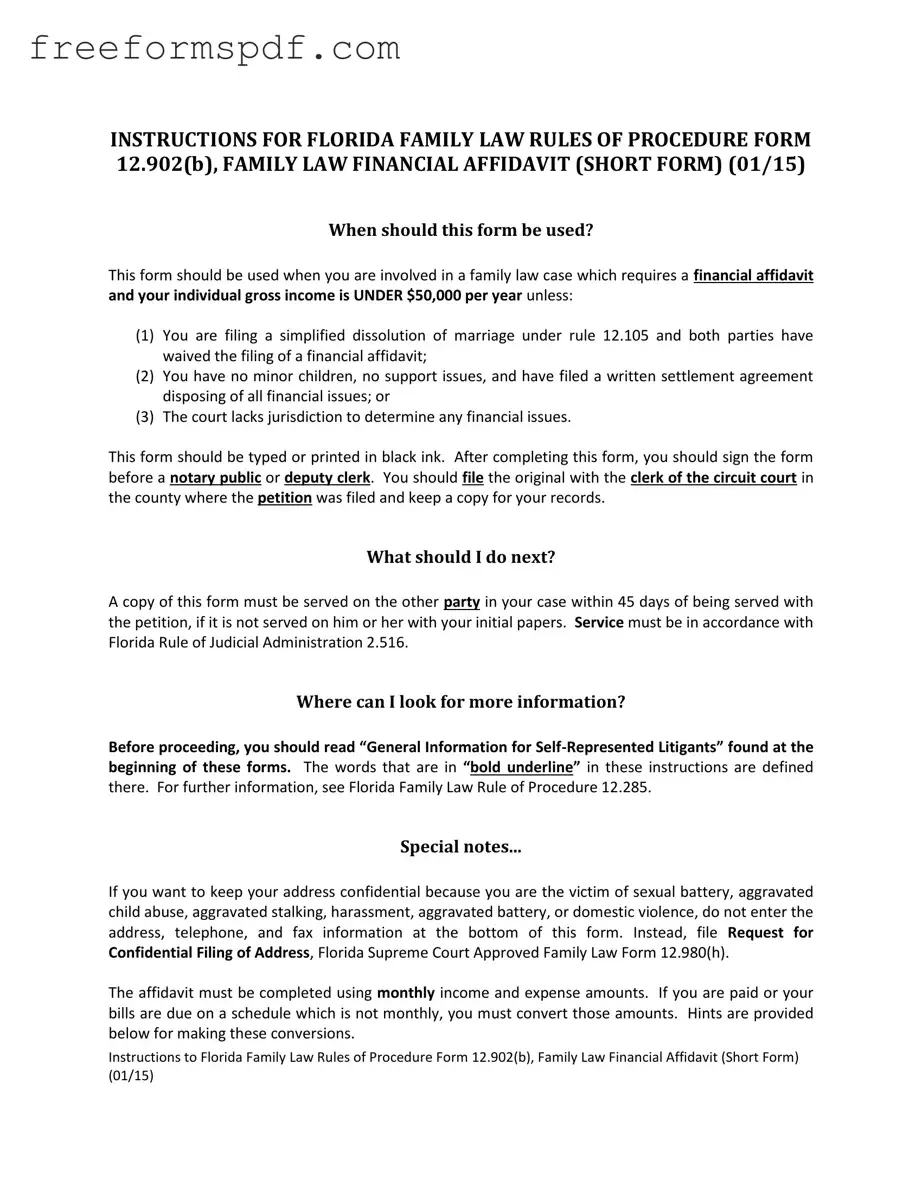Fill in a Valid Florida Financial Affidavit Short 12.902(b) Template
Common mistakes
-
Failing to provide complete and accurate information. It is essential to fill in all sections of the form. Leaving out details can lead to delays or complications.
-
Not including all sources of income. People often forget to list side jobs, rental income, or other earnings. This can result in an incomplete picture of financial status.
-
Overlooking debts and liabilities. Some individuals may neglect to mention credit card debts or loans. This omission can misrepresent financial obligations.
-
Using outdated values for assets. It is important to provide current market values for properties and investments. Using old figures may not reflect true financial conditions.
-
Not signing the affidavit. An unsigned form is not valid. Ensure that the affidavit is signed and dated before submission.
-
Failing to provide supporting documents. Attach necessary documentation, such as pay stubs or bank statements. This helps verify the information provided.
-
Ignoring the need for updates. Financial situations can change. It is crucial to update the affidavit if there are significant changes in income or expenses.
Learn More on This Form
-
What is the Florida Financial Affidavit Short 12.902(b) form?
The Florida Financial Affidavit Short 12.902(b) form is a legal document used in family law cases, particularly during divorce or child support proceedings. It provides a snapshot of an individual's financial situation, including income, expenses, assets, and liabilities. This form helps the court assess financial needs and obligations, ensuring fair decisions regarding support and property division.
-
Who needs to complete this form?
Typically, both parties in a divorce or child support case are required to complete the Florida Financial Affidavit Short 12.902(b) form. If you are seeking financial support or are being asked to pay support, you will need to provide this information to the court. It's essential for both parties to be transparent about their finances to facilitate a fair resolution.
-
How do I fill out the form?
Filling out the Florida Financial Affidavit Short 12.902(b) form involves several steps:
- Begin by entering your personal information, including your name, address, and case number.
- List your sources of income, such as salary, bonuses, and any other earnings.
- Detail your monthly expenses, including housing, utilities, food, and transportation.
- Provide information about your assets, like bank accounts, real estate, and vehicles.
- Lastly, outline any debts you may have, including loans and credit card balances.
Be honest and thorough. Incomplete or inaccurate information can lead to complications in your case.
-
What happens if I don’t submit the form?
Failing to submit the Florida Financial Affidavit Short 12.902(b) form can have serious consequences. The court may view this as a lack of cooperation, which can negatively impact your case. You might face delays in proceedings, or the court could make decisions regarding support and property division without a complete understanding of your financial situation. It’s crucial to meet all deadlines and requirements to protect your interests.
-
Can I amend the form after submission?
Yes, you can amend the Florida Financial Affidavit Short 12.902(b) form after submission if your financial situation changes or if you discover errors. It’s important to keep the court informed of any significant changes, such as a new job, a change in income, or unexpected expenses. To amend the form, you may need to file a new version with the updated information and possibly explain the changes to the court.
Misconceptions
Understanding the Florida Financial Affidavit Short 12.902(b) form can be challenging. Here are four common misconceptions about this form:
- It is only for divorce cases. Many people believe that the Florida Financial Affidavit Short 12.902(b) form is applicable only in divorce proceedings. However, this form can also be used in other family law matters, such as child support and alimony modifications.
- Completing the form is optional. Some individuals think that filling out the financial affidavit is optional. In reality, the court often requires this form to assess financial situations accurately. Providing complete and accurate information is essential for fair decisions.
- Only income needs to be reported. A common misconception is that the form only requires reporting income. In fact, the affidavit also requires disclosure of expenses, assets, and liabilities. A full financial picture is necessary for the court's evaluation.
- Once submitted, the information cannot be changed. Many believe that the information provided on the affidavit is final. However, individuals can amend their financial affidavit if their circumstances change. It’s important to keep the court informed of any significant financial updates.
Browse More Forms
How to Count Down a Register - Engages employees to take ownership of cash management tasks.
The New York Certificate form is a legal document used to officially establish a corporation in New York State. It outlines essential details such as the corporation's name, purpose, and share structure. Filing this certificate is a crucial step in the incorporation process, ensuring compliance with state regulations. For additional resources and templates, visit NY Templates.
Guardianship Documents - A short-term solution to address immediate child care needs.
